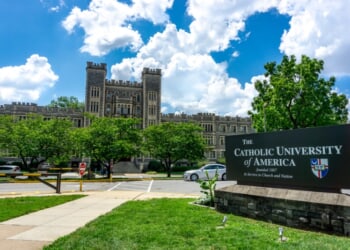Sanctions relief are just a start to what is needed to help war-torn Syria recover.
US President Donald Trump’s meeting with Syria’s transitional leader, Ahmed al-Shara, in Riyadh last week was accompanied by a landmark announcement: the United States will lift sanctions on Syria, paving the way for investment and reconstruction to help the country recover from 13 years of devastating civil war. This is a welcome development that will ease Syria’s re-entry into the global economy and bring much-needed relief for the millions of civilians reliant on humanitarian aid. Less than a week later, the EU also announced it would lift economic sanctions on Syria.
However, these moves by Washington and Europe are just a first step, and Syria’s future depends on the proactive intervention of regional and global powers with interests in a stable Damascus. Actors like Saudi Arabia, the United Arab Emirates, and Turkey should take advantage of the current moment to rekindle Syrian reconstruction and aid efforts. Doing so will set post-Assad Syria on the path most likely to degrade Iran’s influence in the region further, produce fewer spillover conflicts for neighboring countries, and relieve the decades-long suffering of the Syrian people.
Following Bashar al-Assad’s ouster in December 2024, many countries are now seeking influence with the new government in Damascus. While much of the international community remains hesitant to engage with al-Shara, given his historic ties to designated terrorist organizations, the worst way to mitigate risk in volatile post-Assad Syria is by doing nothing.
The international community should be actively engaged in supporting the country’s transition. While the lifting of U.S. and EU sanctions is a helpful start, it must be accompanied by broader diplomatic outreach, investment, and humanitarian intervention. Without this vital support and proactive engagement, Syria—and the broader region—are likely to suffer once again the effects of civil war, mass displacement, weapons trafficking, and drug smuggling.
Many of the United States’ partners and allies—especially Turkey and Saudi Arabia—have a vested interest in seeing Syria stabilize under al-Shara, but their indecision and uncertainty over how to handle complex policy debates are preventing them from taking meaningful action. The “wait and see” approach is highly unlikely to facilitate positive change, and the longer Syria goes without significant transitional support from the international community, the more likely it is to experience increasingly deadly bouts of sectarian violence.
Washington’s partners should build on the momentum sparked by Trump’s May 13 announcement and expedite sanctions relief to facilitate the major aid operations and construction projects needed to repair the devastated country, which will likely require a budget of $250 billion to $400 billion (according to a 2019 estimate).
The Gulf states also have a role to play in leveraging their significant financial resources to both support greater regional stability and simultaneously degrade Iranian influence on Syria’s transitional government. Saudi Arabia and Qatar recently paid off Syria’s outstanding $15 million World Bank debt in an effort to facilitate the country’s reentry into the global financial system. To have the greatest positive impact, the Gulf Cooperation Council states should also partner with Turkey to spearhead investment in the Syrian economy and reconstruction effort. Washington’s recent announcement on sanctions relief will likely contribute to relieving investor anxiety and encouraging businesses to re-enter Syria.
The United States’s approach to post-Assad Syria is also being shaped by pressure and influence from Israel, which has been lobbying the United States to keep al-Shara’s government weak and the country decentralized. While Israel may think it will be safer this way—Prime Minister Benjamin Netanyahu reportedly asked Trump not to provide Damascus with sanctions relief—another civil war or uprising could result in a more dangerous regime coming to power in Damascus, creating deadly spill-over effects that pose a threat not only to Israel but also the entire region.
Syria’s neighbors also stand to gain from a more stable government and a functioning Syrian economy. Turkey’s interests in Syria are two-fold: preventing the establishment of a Kurdish statelet on its southern border and encouraging the return of some of the three million Syrian refugees living in Turkey. The rapprochement between Ankara and the Kurds offers an opportunity for a less hostile relationship between the two. In addition, the recent agreement between Damascus and the Kurds to fully integrate Kurdish civil and military institutions into a central government suggests Turkey may not need to be concerned about an autonomous region threatening its border security. Furthermore, the agreement that dissolved the Kurdish-led Syrian Democratic Forces (SDF) opens up the potential for an end to the conflict in northeastern Syria between Syrian Kurdish forces and Turkish-backed militias.
These developments are positive steps that remove potential obstacles to establishing long-term stability in Syria. Turkish president Recep Tayyip Erdogan described the lifting of U.S. sanctions on Syria as an example for other countries to follow and noted Turkey’s commitment to partnering with Damascus on counterterrorism efforts. Turkey should seize this opportunity to provide funding, training, and military assistance to Damascus to aid its efforts to unify the country’s many armed groups into a central army. This would, in turn, ensure that a centralized state is better equipped to prevent sectarian violence and counter the lingering ISIS presence, creating a safer environment for both Syrian refugees and Turkish business investment.
With financial support from American partners, northeastern Syria’s Kurds are also key to preventing a resurgence of the Islamic State. The SDF currently controls the prisons and detention centers that hold tens of thousands of suspected IS fighters and their families, making them crucial to the long-term stability of Syria. But after decades of marginalization under the Assads, the Kurds are seeking reassurances that their rights will be protected and that they might retain a degree of the autonomy gained during the civil war.
Al-Shara guaranteed the Kurds full political and constitutional rights, but the details of a future Syrian constitution and government structure will take time to work out. In the meantime, the risks of an ISIS resurgence are real, and quickly finding a long-term, durable solution to the detention and foreign fighter problem in northeastern Syria should be a priority. Damascus and the Kurds need to work together, ideally with the support of Washington, to establish diplomatic channels that enable countries to repatriate their citizens and address legal loopholes related to citizenship and prosecution.
The United States currently maintains approximately 2,000 troops in northeastern Syria, who conduct regular counterterrorism operations in an effort to prevent an ISIS revival. In April, the Trump administration announced its intent to significantly reduce the number of American troops stationed in northeastern Syria. This is an unwise move at a fragile time—doing so assumes that local Kurdish forces and the Syrian Arab Army possess the adequate skills and resources to hold back the IS threat without relying on international support or funding.
Additionally, pulling troops out of Syria would mean reducing U.S. influence in the region during this strategic moment and ceding more influence to Moscow, which currently seeks to retain access to two Assad-era military bases in exchange for desperately needed cash and investments in Syrian gas and port infrastructure.
It is in the United States’ strategic interest to continue actively engaging with Damascus in such a way that encourages al-Shara to lean on the West, rather than Moscow, for economic assistance. In turn, this would reduce Moscow’s ability to share intelligence and advanced weapons technology with Iranian proxies across the region.
Damascus itself has a lot of work to do to rebuild Syria. Almost 70 percent of the population relies on humanitarian aid, the risks of sectarian violence are ever-present, and the country’s economy has been decimated by 13 years of civil war. Large-scale support for reconstruction must also compete for attention with simultaneous crises in Gaza, Ukraine, and Sudan against the backdrop of a faltering global economy. Al-Shara needs to prioritize increased security and stability, both to improve conditions for Syria’s citizens and to demonstrate that the country has truly turned a corner.
Thus far, al-Shara has relied on a strategy of consistent outreach and dialogue; this will remain crucial as Damascus works to reestablish relations with its neighbors and major global powers after a period of prolonged isolation. His meeting with President Trump in Riyadh is a significant achievement and will likely reassure other countries who are debating the risks and merits of reengaging with Syria.
As demonstrated by the overlapping and often conflicting interests of dozens of actors throughout the grueling civil war, what happens next in Syria will have wide-ranging implications far beyond its borders. Given that there are so many stakeholders interested in Syria’s future, it’s unlikely that all countries will agree on the best way to support its transition, but they don’t need to. Individual states should instead take advantage of the momentum sparked by the end of U.S. and EU sanctions, start facilitating aid shipments, and support transition initiatives while thinking critically about the cost-benefit analysis of “waiting” for the perfect moment to prevent another civil conflict in Syria proactively.
Failure to support transition at this opportune moment would be a missed opportunity for the international community, which can not only reduce the suffering of millions and restore hope to a war-ravaged country but also take significant steps toward stabilizing a region still suffering from the ill effects of decades of conflict.
About the Authors: Delaney Soliday and Kate Johnston
Delaney Soliday is a research assistant with the Middle East Security Program at the Center for a New American Security. Prior to joining CNAS, she was a research assistant for the Jeanette and Eli Reinhard Program on Counterterrorism and Intelligence at the Washington Institute for Near East Policy. She holds a BA in Global Affairs from George Mason University. Her language skills include both English and Arabic.
Kate Johnston is an associate fellow in the Transatlantic Security Program at the Center for a New American Security (CNAS).
Image: Nazeeh H / Shutterstock.com.

















